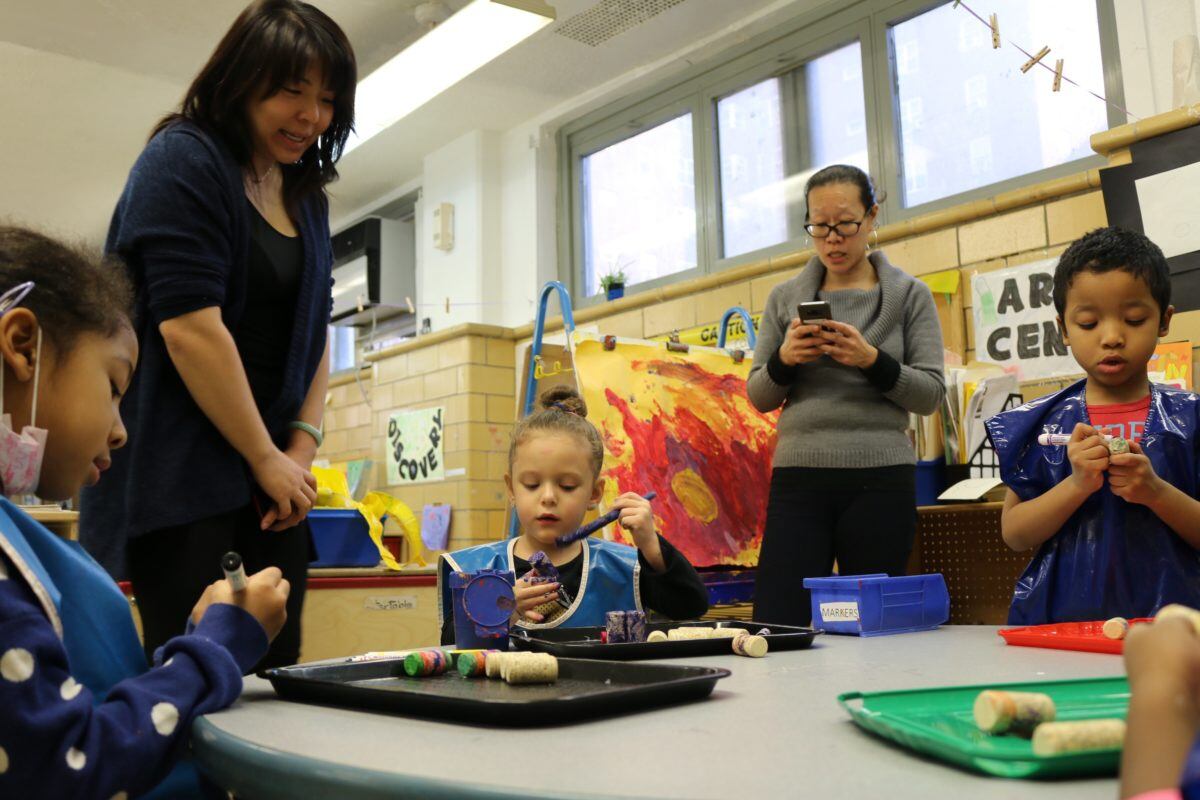This story was originally published on Oct. 25 by THE CITY. It was done in partnership between THE CITY and The Fuller Project.
Child care providers in buildings managed by the city’s public housing authority say despite years of fighting for better conditions, youngsters face unsanitary and at times unsafe conditions.
And the providers, grappling with massive economic blows due to the pandemic, contend NYCHA has often left them to pick up the tab for necessary repairs.
Dawn Heyward, deputy director of early childhood education at East Side House Settlement, whose program runs out of a Bronx NYCHA facility, said she’s been waiting five years for Housing Authority officials to provide air conditioning and heat to the center’s gymnasium.
Her center had to pay out of pocket to ensure consistent heating in classrooms by installing its own dual air conditioning and heating units, Heyward said.
“NYCHA is the most challenging part of my job,” she added. “Not the child care, but making sure when the children walk in this building they’re safe.”
Child care centers typically lack funds to pay for things like heating equipment, said Heyward, whose program is federally funded.
Issues like lack of heat and hot water, mold, leaks and pest problems go beyond the child care centers in NYCHA facilities. Reporting from THE CITY has found widespread issues with lead and mold in New York City public housing units, in addition to poor ventilation that may have helped fuel the spread of COVID-19 in public housing.
But some providers in the roughly 400 child care centers in NYCHA complexes say the city should pay special attention to the health risks posed to young children.
Hot Water Harm
“School should be a place where you’re safe…and where health and safety should be a priority,” said Yvette Ho, education director at the Jacob Riis Early Childhood Center in the East Village. “But that’s not necessarily the case because we’re working with NYCHA as our landlord.”
Ho said she’s seen clear examples of NYCHA mismanagement, including repeated failures to notify the child care center when leaks are scheduled to be fixed in the residential part of their building. This has led to random hot water shut-offs, resulting in the emergency closure of the center and parents having to take time off from work.
Every year when the building switches on the heat, Ho said, the steam pipes burst without warning, sending potentially scalding water raining down into the center.
Last year, she said, the fire alarm system detected the rising pipe temperatures, allowing the center to avoid any injuries to children. But as winter approaches, she worries that children at the center, who are as young as 1, could be badly burned.
“We’re putting Band-Aids over issues that could have been constantly maintained so that it doesn’t lead up to that — a steam pipe burst,” Ho said.
Massive Repairs Needed
Fixing the problems at Jacob Riis and other facilities is likely to be expensive. In 2019, over $130 million in repairs were needed in day care centers in NYCHA buildings, Chalkbeat reported.
“It’s no secret that there are capital issues at NYCHA,” said Nora Moran, director of policy and advocacy at the United Neighborhood Houses, a nonprofit that advocates for settlement houses throughout the city, including several with child care facilities.
Moran said investments in public housing from the federal government, in the form of infrastructure legislation like the Build Back Better bill, are needed to alleviate NYCHA’s massive repair backlog.
“When NYCHA is suffering, it has ripple effects to a variety of things in the community,” state Sen. Jabari Brisport (D-Brooklyn), who chairs the Senate’s Committee on Children and Families and has been touring child care facilities throughout the state, told The Fuller Project and THE CITY.
Conditions like lack of heat at the East Side House Settlement and broken light fixtures in other facilities Brisport visited indicate inadequate NYCHA funding, he said.
Brisport believes the best way to ensure issues in NYCHA-managed day care centers are safe for young children and staff is to focus on federal legislative efforts. However, if the federal funding falls through, he says New York will have to make up a massive funding gap, estimated at $40 billion, elsewhere.
NYCHA did not immediately respond to questions about child care centers in its facilities.
‘A Systemic Problem’
Democratic mayoral nominee Eric Adams has said that if elected he would ask for tens of billions in federal funding to repair NYCHA facilities. In addition, Adams said he would create a monitoring program called “NYCHAstat,” to track spending and repairs status, according to Gotham Gazette.
Adams has not called for additional New York City funding for NYCHA, according to the Association for Neighborhood Housing Development.
At Jacob Riis, Ho says response time to maintenance calls has improved thanks to her team’s efforts over the years to build up relationships with local management. Still, much work remains to safeguard the children attending day care in NYCHA facilities.
“This is like a much bigger problem than one child care facility in one development in New York that they can fix like that,” Ho said. “This is a systemic problem.”






